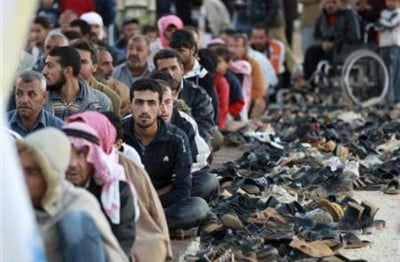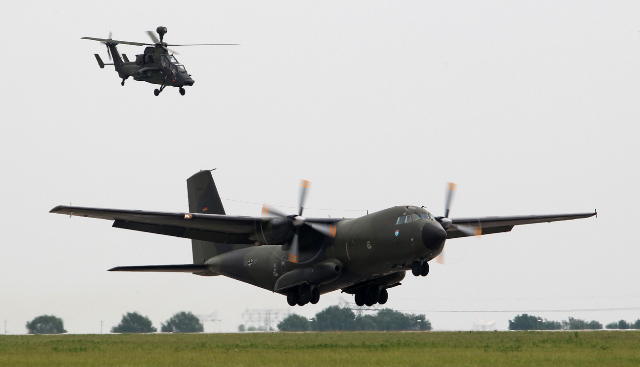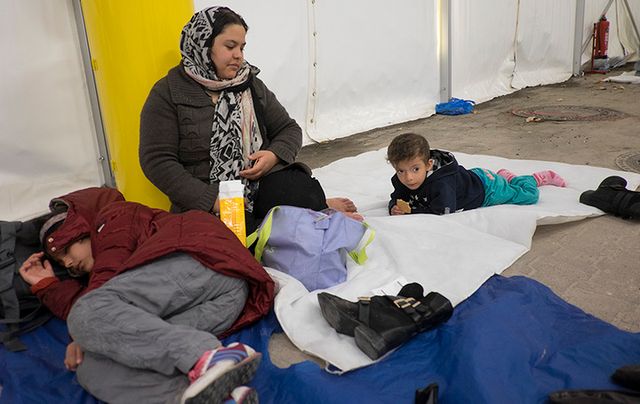Germany to Deport Refugees in Military Cargo Planes

As growing numbers of refugees seek asylum from the wars raging in Syria and Iraq, governments throughout Europe are moving to seal their borders, slash social assistance for migrants, and carry out mass deportations.
This week, the Bild newspaper reported that the German government plans to use military aircraft to deport tens of thousands of refugees whose requests for asylum have been denied. According to the newspaper, the government is planning to use C-160 military transport planes to deport nearly 200,000 people who have been declared by the German state to be “economic migrants” and ineligible for asylum.

Image: A German army C-160 Transall cargo transport airplane
The newspaper said that the use of the military for deportations, unprecedented in Germany’s postwar history, will be part of a dramatic crackdown on refugees. Germany will not honour its unofficial moratorium on deportations during the winter months, and will cease giving refugees advance warning that they will be deported to prevent them from fleeing.
In addition, the German government is preparing to set up “transit zones” along its border, in substance little different from concentration camps, where refugees are to be held while their applications are processed.
German government officials did not deny the newspaper’s revelations. “Obviously, the usage of the Transall [troop carrier aircraft] is not ruled out,” Defence Minister Ursula von der Leyen declared. She added, with chilling casualness, that the aircraft would be made available “if it does not affect the German army’s priority missions.”

Image: Children sleeping on the ground at a refugee processing center in Berlin, Germany (Photographer Ludwig Niethammer)
The revelations follow the passage of a bill in the German parliament that slashes social aid to refugees who qualify for assistance and expands the number of countries from which refugees are to be denied asylum in accelerated proceedings.
Meanwhile, the countries on the major transit routes into Europe are intensifying their crackdown on refugees. The parliament of Slovenia approved the deployment of its army to the border on Tuesday night. An initial 140 soldiers are being stationed on the border and will have the authority to detain refugees and issue orders to local residents.
Shocking scenes are playing out on the borders between Slovenia and Croatia, Hungary and Croatia and Macedonia and Greece. Refugees are wading through ice-cold rivers, knee-deep in mud, soaked to the bone by rain or shivering from cold in temporary tent camps without heating and often having to sleep overnight on the ground.
“This is inhumane. We fled from war, from destruction. We lost everything: our families, our children. The bombs killed us,” Haidar, who fled from Iraq and is currently stranded on the Greek-Macedonian border at Gevgelija, told the German public broadcaster ARD.
The situation facing refugees on the so-called Balkan route has worsened dramatically following the closure of the Hungarian-Croatian border last Friday. Since then, refugees have been forced to extend their travel through Slovenia in order to reach northern and central Europe.
Over 12,000 refugees arrived in Slovenia on Thursday, and a further 12,100 refugees remain in Serbia awaiting passage into Croatia.
A fire broke out at a hugely overcrowded refugee camp in the Slovenian border town of Brezice on Wednesday, burning the majority of the emergency tents. It remains unclear whether the fire was set by refugees in protest of the abysmal conditions at the camp, or was the result of refugees using fires to keep warm in the cold rain.
On Wednesday, Zeid Ra’ad Al Hussein, High Commissioner for Human Rights, accused the Czech Republic of violating the human rights of refugees in order to deter them from entering the country.
In a statement, Zeid said:
“According to credible reports from various sources, the violations of the human rights of migrants are neither isolated nor coincidental, but systematic. They appear to be an integral part of a policy by the Czech Government designed to deter migrants and refugees from entering the country or staying there.”
Measures cited by Zeid include the strip-searching of refugees in order to confiscate their money, which is then allegedly used to pay for their detention.
This week the EU opened the first “hot spot” internment camp on the Greek island of Lesbos. Refugees are to be registered there and have their asylum applications processed in expedited proceedings by officials from the Frontex border protection agency. The camp at Moria is expected to hold 2,500 people. But over the weekend, 5,000 new refugees arrived.
Last weekend alone, 16 refugees drowned on the crossing to Greece. On Friday, the Greek coast guard recovered the bodies of four children near the island of Kalymnos, and another boy remained missing. A further twelve refugees drowned near the Turkish coast when their boat capsized on the way to Lesbos.
According to the International Organization for Migrants, 473,000 refugees have arrived in Greece since the beginning of the year, overwhelmingly from the war zones in Syria, Afghanistan and Iraq. More than 150 have lost their lives.
Meanwhile, conditions confronting refugees stranded at the French port of Calais awaiting the chance to cross the Channel Tunnel have worsened catastrophically. The number of refugees in the camp has doubled to 6,000 in recent weeks. The refugees, including families with children, live in tents and huts they have built themselves.
“We stand on the verge of collapse,” said Jean-Francois Corty, director of French operations for Doctors of the World. The French government has proposed the construction of a new tent and container camp, but it would accommodate a mere 1,500 people and would not be ready until after winter.
The EU’s “humanitarian” response to the crisis has been largely nonexistent. The high-profile plans to resettle 160,000 refugees from Italy and Greece into other member countries has remained a dead letter, with just 19 refugees having been flown from Greece to Sweden. And from the much talked-about €2.8 billion for refugee aid, only a small fraction has been made available.

